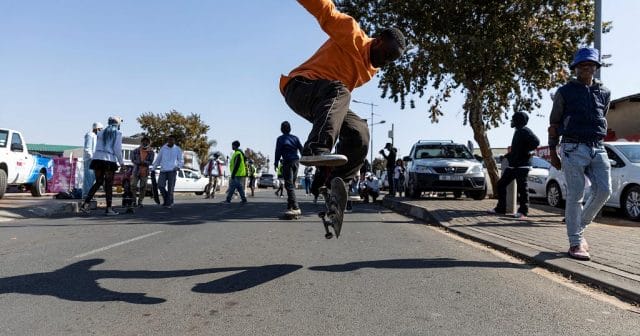
Dozens of skateboarders took to the streets of Vilakazi in Soweto, South Africa on Wednesday in celebration of the nation’s 45th anniversary of Youth Day — the public holiday declared by freedom fighting icon Nelson Mandela.
The Soweto Skateboard Society organised the event, known as “bombing” in the sports jargon, meaning high-speed downhill on city streets.
The day honours the student protests against the white supremacist apartheid regime that claimed over 100 black young lives on June 16 1976. A bloody incident that played a key role in ending the regime that oppressed South Africa’s indigenous black population.
After thousands of blacks students demonstrated in protest the imposition of the Dutch-based Afrikaans language in schools, the image of the 13-year old lifeless body of Hector Pieterson being carried by mournful friend Mbuyisa Makhubu highlighted the brutality of the white apartheid government against Black South Africans.
The circulating pictures around the world from the day’s violence made it so it became harder for the shocked international community to complicity ignore the gravity of apartheid.
Beki Dube, a local skateboarder, reflects on the progress in terms of some of his basic human rights as an African and black person now being a given within society in his day to day life.
“I feel like we have come a long way. The fact that I can travel to any country, I can go anywhere I want, and I can do whatever I want to do, and study whatever I want to study without anyone telling me anything. I feel great.”
Although officially over on paper, its racist residue still lingers in South Africa as leaders like President Cyril Ramaphosa make efforts to truly heal the economic and social consequences of the racial divide towards a brighter future for the nation’s youth.
“South Africa is an infinitely better place than it was in 1976. Young people have opportunities that were denied to their parents and grandparents,” said President Cyril Ramaphosa, addressing a virtual Youth Day event on Wednesday.
However, Ramaphosa acknowledged that 27 years after the end of apartheid — despite some racial progress, there is still much o be done in order to truly elevate the country’s young people.
“We know that our challenges today are many. Nearly 64% of young people in South Africa are unemployed. This is something no country can afford,” he said.
Ramaphosa pledged that his government will launch various initiatives to support youth-owned businesses, develop their skills in various sectors and create job opportunities.
Such programs are long overdue, according to Mothibedi Mohoje, a 35-year-old entrepreneur in Soweto who operates three internet cafes in the townships and employs at least six people.
“As a young person in South Africa, I really feel our government is letting us down. I think they should be supporting people like myself who are creating jobs in the townships,” he said.
“Many of us have never got jobs and we decided to start our own businesses, but we hardly get any support from the government,” said Mohoje.
He said some of the country’s unemployed youths turn to crime and others blame foreigners for taking jobs, resulting in deadly xenophobic violence.
On the anniversary of the student uprising that helped to end the country’s racist system, Mohoje said that South Africa’s youths need better educations and employment opportunities.

